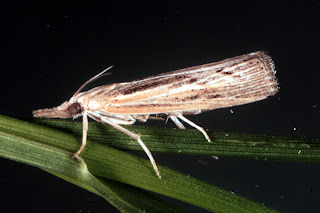Most likely, moths are the adult stage of sod webworm. The sod webworm larva themselves can be very destructive to your lawn. While the moths are
annoying, as they stir up and fly close to your lawn, they spread the eggs for the larva. There
could be up to 4 generations of sod webworms on your lawn in one season. One
female can lay up to 200 eggs at once.
Damage
caused by sod webworms may appear in early spring as small dead patches of your lawn. As summer
progresses, sod webworm infestations may cause more turf thinning or irregular dead
patches in the early fall. Webworm moths and
larva prefer warm sunny areas. Heavy shaded areas are usually not targeted by larva.
The most
severe damage usually shows up in mid to late summer when temperatures are hot
and the lawn isn't growing vigorously.
If you keep your lawn well-irrigated, fertilized and thatched you may not
sustain much damage. Sod webworms damage is often mistaken for heat and drought
stress.
If you are
reading this because your lawn is starting to look like this. Or you have white/tan moths on your lawn you have sod webworm and you should get treatment immediately. You
should also get on our fertilization schedule to bring your lawn back to
health. Dead areas may also need to be reseeded. Do you have chinch bug, grub damage, excessive thatch, or fungus
activity? Contact us today 860-747-1771 or CLICK HERE for a FREE evaluation.


No comments:
Post a Comment